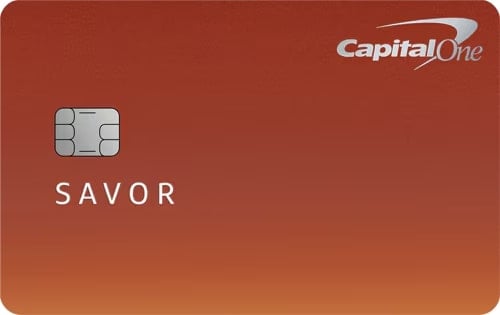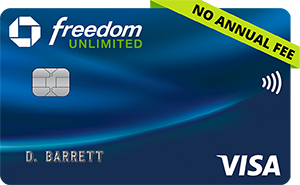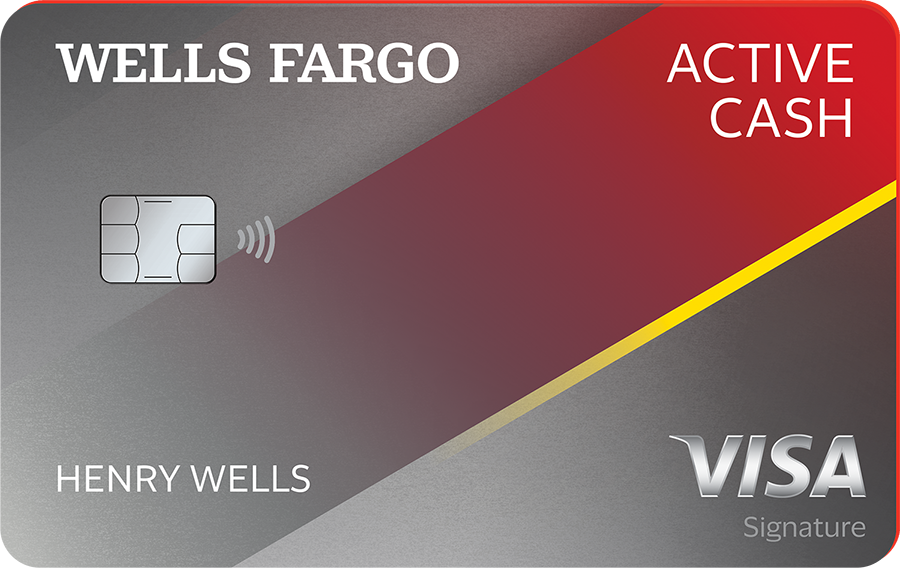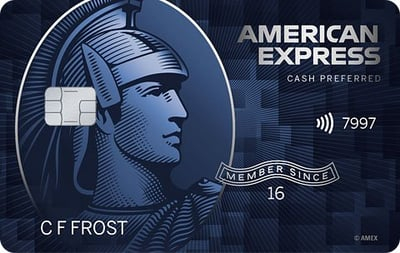Capital One Savor Review: Foodie-Focused Rewards, for No Fee
The Bottom Line
5.0
If you're a frequent restaurant diner or grocery shopper, it'll be hard to find a better cash-back card for no annual fee. And it's also a great pick for entertainment spending, whether you're catching a movie in the theater or at home.


Rates, fees and offers
Rates, fees and offers
Annual fee
$0
Rewards rate
1%-8%
Bonus offer
Earn a one-time $200 cash bonus once you spend $500 on purchases within the first 3 months from account opening.
Intro APR
0% intro APR for 15 months on purchases and balance transfers; balance transfer fee applies
Ongoing APR
APR: 19.24%-29.24% Variable APR
Cash Advance APR: 29.24%, Variable
Balance transfer fee
Balance transfer fee applies
Foreign transaction fee
0%
More details from Capital One
More details from Capital One
- Earn a one-time $200 cash bonus once you spend $500 on purchases within the first 3 months from account opening
- Earn unlimited 3% cash back at grocery stores (excluding superstores like Walmart® and Target®), on dining, entertainment and popular streaming services, plus 1% on all other purchases
- Earn 8% cash back on Capital One Entertainment purchases
- Earn unlimited 5% cash back on hotels and rental cars booked through Capital One Travel, where you'll get Capital One's best prices on thousands of trip options. Terms apply
- No rotating categories or sign-ups needed to earn cash rewards; plus cash back won't expire for the life of the account and there's no limit to how much you can earn
- 0% intro APR on purchases and balance transfers for 15 months; 19.24% - 29.24% variable APR after that; balance transfer fee applies
- No foreign transaction fee
- No annual fee
Pros and Cons
Pros
No annual fee
Intro APR period
Bonus categories
No foreign transaction fees
Cons
Requires good/excellent credit
Detailed Review
Some people go out all the time. Some people are dedicated homebodies. The Capital One Savor Cash Rewards Credit Card is the rare credit card that offers outstanding benefits regardless of which group you fall into, or if you have a leg in both.
For those who love the night life, this $0-annual-fee card (see rates and fees) offers unlimited 3% cash back on dining and entertainment. For those who like to chill at home, it also earns unlimited 3% cash back at grocery stores and on eligible streaming services. You'll get 1% cash back on purchases outside these categories.
The potential to earn such a rich rate on both eating out and eating in helps separate this card from much of its competitors, which tend to focus on only one of those categories or the other. It's possible to find similar or higher rates in either of those categories, but rarely on both with the same card unless you're willing to cough up an annual fee.
Prior to Oct. 22, 2024, the $0-annual-fee Capital One Savor Cash Rewards Credit Card, discussed here, was known as the Capital One SavorOne Cash Rewards Credit Card. Capital One previously offered two Savor-branded cards — the "Savor," which had an annual fee, and the "SavorOne," which did not. Capital One stopped taking applications for the annual-fee version in July 2024. Then in October, the former SavorOne card took on the Savor name.
Capital One Savor Cash Rewards Credit Card: Basics
Card type: Cash back.
Annual fee: $0.
Sign-up bonus: Earn a one-time $200 cash bonus once you spend $500 on purchases within the first 3 months from account opening.
Rewards:
3% cash back on dining, at grocery stores, on entertainment and on popular streaming services.
5% cash back on hotels and rental cars booked through Capital One Travel.
8% back on Capital One Entertainment purchases.
1% cash back on all other purchases.
Interest rate: 0% intro APR on purchases and balance transfers for 15 months; 19.24%-29.24% variable APR after that; balance transfer fee applies.
Foreign transaction fees: None.
Minimum redemption requirement: None.
Credit score requirement: The Capital One Savor Cash Rewards Credit Card is available to applicants with good to excellent credit. However, some applicants with less-than-excellent credit may be offered a different version of this card, one that has the same cash back rewards but not the sign-up bonus or intro APR period. If this is the case, you'll be told during the application process and given the chance to accept or decline.
How this card defines 'dining and entertainment'
Dining includes purchases at "restaurants, cafes, bars, lounges, fast-food chains and bakeries," according to the issuer's website for this card.
Entertainment is defined this way on the issuer's website for this card: "Ticket purchases made at movie theaters, sports promoters (professional and semi-professional live events), theatrical promoters, amusement parks, tourist attractions, aquariums, zoos, dance halls, record stores, pool halls or bowling alleys. This excludes golf courses, collegiate sporting events and non-industry entertainment merchant codes like cable, digital streaming and membership services." Note, however, that select streaming services are included in a separate 3% bonus category.
How this card defines eligible streaming services
Some issuers, such as American Express, maintain a comprehensive list of services that qualify for bonus rewards on streaming. But Capital One has yet to publish such a list. As of January 2025, its website was describing eligibility this way: "Streaming purchases made from eligible music and video streaming services, including but not limited to Netflix, Hulu and Disney+. Some services such as Verizon FIOS On Demand, audiobook subscriptions, and fitness programming are excluded."
Other Savor cards
The Capital One Savor Cash Rewards Credit Card isn't the only card under Capital One's Savor brand. There's also a version for college students.
Compare to Other Cards

Benefits and Perks
Whether your taste in food runs from Michelin-starred to Mickey D's to Meijer supermarkets, you can get plenty of value out of the Capital One Savor Cash Rewards Credit Card. It has broad definitions of "dining" and "entertainment." Plus, unlike some of its competitors, it doesn't limit how much spending is eligible for its higher rewards rates, and it doesn't have a minimum amount for redeeming your rewards.
So what counts as a "restaurant" or a "tourist attraction"? It comes down to the merchant classification code assigned to the business where you use your card. If the merchant is using a code that Capital One defines as a dining or entertainment expense, you should get 3% cash back for it.
No annual fee
A lot of cards that offer bonus rewards for dining are also travel cards with steep annual fees. That’s a pain if you aren't spending thousands of dollars in the card’s bonus categories. The Capital One Savor Cash Rewards Credit Card offers more breathing room with its annual fee of $0. There's no need to worry about spending a certain amount before breaking even on rewards (see rates and fees).
Solid offers for new cardholders
A sign-up bonus and an introductory 0% APR period are nearly table stakes for good cash-back credit cards nowadays, and the Capital One Savor Cash Rewards Credit Card doesn't disappoint. For a break on interest, you get 0% intro APR on purchases and balance transfers for 15 months; 19.24%-29.24% variable APR after that; balance transfer fee applies. And the bonus offer doesn't take a lot of work to claim: Earn a one-time $200 cash bonus once you spend $500 on purchases within the first 3 months from account opening.
Ability to combine rewards with other Capital One cards
Foodies who prefer to keep one card in their wallet could get significant value out of the Capital One Savor Cash Rewards Credit Card. But it's an equally excellent choice for travelers who hold the $395-annual-fee Capital One Venture X Rewards Credit Card or one of its lower-annual-fee siblings and wish to get as much value as possible out of their credit card rewards (see rates and fees).
Nerds who have these cards confirm that you can move rewards you earn on the Capital One Savor Cash Rewards Credit Card to a card in the Venture family. Such transfers come at a rate of 1 Capital One mile for each 1 cent transferred. From there, you can redeem as usual on the Venture-branded card. According to NerdWallet's valuations of Capital One miles, they are worth 1 cent apiece when redeemed for statement credit against travel purchases or when used to book travel through Capital One. You can also transfer them to Capital One's airline and hotel partners; miles are worth an average of 1.2 cents when redeemed this way, according to our valuations.
It's important to note, though, that you can only transfer rewards from the Capital One Savor Cash Rewards Credit Card to one of the Venture cards, not the other way around.
MORE NERDY PERSPECTIVE
 | This card’s elevated rewards on dining and entertainment make it an easy one-and-done card for a night out with friends. And the grocery rewards are an added bonus. It has long been a staple in my wallet. But now that I can transfer my rewards to my Venture card, it’s even more valuable. Caitlin Mims, content management specialist, credit cards and travel rewards |
Drawbacks and Considerations
If dining out is your biggest line item, you can do better
If you don't cook much at home, consider instead the U.S. Bank Altitude® Go Visa Signature® Card. It, too, has no annual fee, but it earns a whopping 4X back on dining purchases. Note, however, that this card is not as rewarding on groceries or streaming, and there's no bonus category for "entertainment" spending at all.
Or if drive-thru meals are a major expense for you, look into the no-annual-fee U.S. Bank Cash+® Visa Signature® Card. It earns 5% cash back in two categories of your choice (see the list below), on up to $2,000 spent per quarter on combined purchases. Possible 5% categories include fast food, not to mention TV, internet and streaming services. The card also offers an uncapped 2% back in an everyday category of your choice, including restaurants. All other non-bonus-category purchases earn 1% back.
Full list of 5% categories on the U.S. Bank Cash+
Fast food.
Home utilities.
TV, internet and streaming.
Department stores.
Cell phone providers.
Electronics stores.
Sporting goods stores.
Movie theaters.
Gyms/fitness centers.
Furniture stores.
Ground transportation.
Select clothing stores.
If groceries are your biggest line item, you can do much better — for a fee
For a card with a $0 annual fee, the Capital One Savor Cash Rewards Credit Card offers very good rewards at grocery stores (see rates and fees). Even so, it's possible to double that rate.
Consider the Blue Cash Preferred® Card from American Express, which offers 6% cash back* at U.S. supermarkets (on up to $6,000 in spending each year) and 1% after that. Terms apply (see rates and fees). The card charges a $0 intro annual fee for the first year, then $95. Even with the fee, if you spend around $61 at grocery stores each week, it would be a better deal than the Capital One Savor Cash Rewards Credit Card. Worth noting, also, is that this American Express card earns 6% on select streaming services — twice the rate on the Savor card. If you spend a fair amount on streaming, that makes the annual fee that much easier to earn back.
Costco shoppers can do better
When talking about no-annual-fee dining credit cards from major issuers, you pretty much have to include Costco's popular co-branded card, the Costco Anywhere Visa® Card by Citi. This card offers unlimited 3% cash back at restaurants, in addition to other bonus categories, making it a great option for dining enthusiasts. It's also a better choice if you do most of your shopping at Costco, since it offers an unlimited 2% back on Costco purchases. The Capital One Savor Cash Rewards Credit Card, by contrast, is a Mastercard and isn’t accepted in-store at Costco.
The Costco Anywhere Visa® Card by Citi has an annual fee of $0, but, of course, you must be a Costco member, which has its own fee. If you're going to pay that fee anyway, it's an excellent pick.
You can also visit NerdWallet's best credit cards page to see how these cards compare versus other cash-back alternatives.
To view rates and fees of the Blue Cash Preferred® Card from American Express, see this page.
*Cash Back is received in the form of Reward Dollars that can be redeemed as a statement credit or at Amazon.com checkout.
For Capital One products listed on this page, some of the benefits may be provided by Visa® or Mastercard® and may vary by product. See the respective Guide to Benefits for details, as terms and exclusions apply.
How To Decide If It's Right For You
Foodies of any stripe may want to clear a space in their wallets for the Capital One Savor Cash Rewards Credit Card. In terms of rewards at both restaurants and grocery stores, it may be the best $0-annual-fee option available (see rates and fees). But if your spending tends to lean heavily into one category over the other, other cards can out-earn this one.
This card gives you an industry-leading 6% cash back at U.S. supermarkets, on up to $6,000 a year in spending (then 1%); 6% cash back on select U.S. streaming subscriptions; 3% cash back at U.S. gas stations and on transit (including such things as taxis, rideshares, parking, tolls, trains and buses); and 1% cash back on all other purchases. (Terms apply.) There's a $0 intro annual fee for the first year, then $95.
Looking For Something Else?
Methodology
NerdWallet reviews credit cards with an eye toward both the quantitative and qualitative features of a card. Quantitative features are those that boil down to dollars and cents, such as fees, interest rates, rewards (including earning rates and redemption values) and the cash value of benefits and perks. Qualitative factors are those that affect how easy or difficult it is for a typical cardholder to get good value from the card. They include such things as the ease of application, simplicity of the rewards structure, the likelihood of using certain features, and whether a card is well-suited to everyday use or is best reserved for specific purchases. Our star ratings serve as a general gauge of how each card compares with others in its class, but star ratings are intended to be just one consideration when a consumer is choosing a credit card. Learn how NerdWallet rates credit cards.
About the authors

Claire Tsosie
Managing Editor
Caitlin Mims
Editor & Content Strategist


